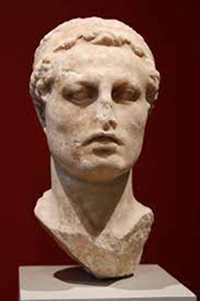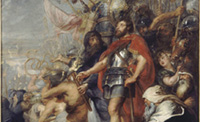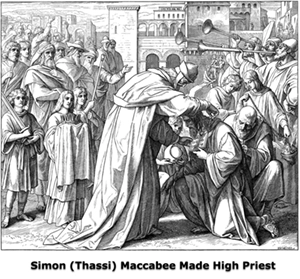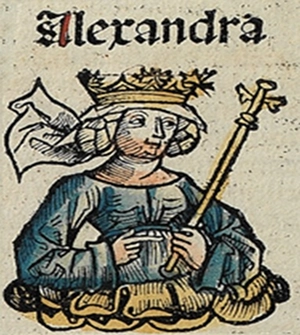
The Hasmonean Dynasty
The Hasmonean dynasty of ancient Judea, were descendants of the Maccabee family. According to Flavius Josephus, the name derived from the name of their ancestor Hasmoneus (Hasmon), or Asamonaios.
In the first half of the second century BCE, Jerusalem was ruled by the Seleucids, (Greeks). Seleucus I was among the generals who inherited parts of Alexander the Great’s sprawling empire. At its height, the Seleucid Empire stretched from Asia Minor, Mesopotamia, Syria, and the Land of Israel, all the way to the Indus River.

Antiochus IV, (who called himself "Epiphanes,") rose to power at a bad time for his prospects. His father had just suffered a serious defeat at the hands of Rome, to whom he lost significant parts of his empire, and he was forced to sign a humiliating surrender agreement that included huge reparations.
Since the Edict of Cyrus the Great, Jerusalem and Judea had enjoyed a degree of religious autonomy, with the Jewish High Priest presiding over worship at the Temple. Though ruled by a series of empires, (the Babylonians, the Medes, the Persians, the Macedonians, the Ptolemies, and now the Seleucids), the Jews enjoyed a measure of religious freedom and maintained their worship in the Temple and the laws of their faith.
What led Antiochus to change this arrangement is not at all clear to historians. However, whatever the reason, he decided to intervene in the religious practices in Jerusalem and Judea, outlawing all Jewish rituals and desecrating the Temple. As a result of this, Mattathias the priest and his five sons raised the banner of rebellion. Significant numbers of the Jewish People gathered around Mattathias and his sons because they were sick of the cruel Hellenic oppression and were willing to die to return to observing the Torah and its commandments in the open.

Judah the Maccabee, the third of Mattathias’ sons, formed and led the small rebel army – at first, with guerrilla actions and later in organized, open battles against the Seleucid army. He went up to Jerusalem with his soldiers and managed to take over large parts of it, most importantly the Temple – which was cleaned and purified. Following this, Jewish religious rituals resumed.
It was during this conflict in Jerusalem that the holiday of Hanukkah had its origin.
Peace did not come after Judah’s famous initial victories. The Seleucids continued to send troops to fight the rebels in Judea. Six years after the miracle of the oil, Judah was defeated by the general Bacchides, falling in the Battle of Elasa. His brother Eleazar also perished when he was trampled to death by one of the Seleucid army’s war elephants. However, the Hasmoneans and their supporters did not despair. The leadership of the rebellion was taken up by Judah's brother Jonathan, who was both a gifted commander and a skilled diplomat. He returned the Hasmoneans to Jerusalem after a series of military victories, and while working primarily at the diplomatic level, he convinced the Seleucid authorities to give him effective control, receiving in 150 BC the titles of strategos (general) and “meridarch” (civil governor).
After holding these title for seven years Jonathan was murdered by a Seleucid ruler named Diodotus Tryphon, and was replaced as leader by his one remaining brother, Simon. Simon, was the one who secured full independence for Judea. He did not yet call himself king, but the moment he fully took the reins of civilian control from the Seleucids and the tax burden was lifted (140 BCE) is when it is agreed the Hasmonean reign had truly begun.

Simon was a wise and beneficent ruler, chosen by an assembly of the people to be their “leader and high priest forever, until a trustworthy prophet should arise”. He conquered additional cities in the Land of Israel such as Gezer and Jaffa, and even succeeded in taking over the Acra – the fortress of Greeks and Hellenized Jews that had remained a thorn in the side of residents of Jerusalem for so long. Six years passed in relative quiet until family strife encouraged by the Seleucids brought about tragedy and betrayal. Simon’s father-in-law, Ptolemy son of Abubus, hoped to gain the throne of Judea for himself. He had received control of the city of Jericho and its surroundings and invited Simon and his sons to a feast at his home. There they were cruelly murdered. Unfortunately for him and for his scheme, one of Simon’s sons, John Hyrcanus, was not present at the feast, and survived to become the Prince and High Priest in his father's stead.
During the reign of John Hyrcanus the internal rift between the different religious factions deepened. Hyrcanus had begun his rule as a religious leader and priest ruling by virtue of broad public support. But a number of choices he made and disputes regarding his position changed his rule to more of an absolute monarchy relying on force-of-arms. His successors would continue to enhance this trend as Greek culture became dominant in the institutions and customs of the ruling class. John (Yochanan) was the first to take a Greek name – Hyrcanus – and after him, this became the standard.
Hyrcanus ruled Judea for 31 years and was the first Hasmonean ruler to die of natural causes. Before his death, he sought to hand over rule to his wife, but his son, Judah Aristobulus didn’t like the idea. When his father died, he simply imprisoned his mother and most of his brothers and declared himself King.
The rule of the first King in Judea since the Biblical era was not a model of benevolent government, but Aristobulus I did make one good decision: he married Salome Alexandra. Aristobulus died from an illness just one year after coming to power, after which, Salome Alexandra freed his imprisoned brothers and married the oldest of them, Alexander Jannaeus. Alexander Jannaeus set out on extensive campaigns of conquest and vastly increased the size of his kingdom, taking over the Hellenistic coastal cities, and conquering Gaza and large swathes of the east bank of the Jordan River.
According to most, Jannaeus was a cruel and tyrannical ruler who did not hesitate to use foreign mercenaries to massacre his opponents. He had to face at least two significant rebellions during his reign, during one of of which he had over 800 rebels hung on the city walls as he enjoyed a banquet in front of them. Although he wished to execute his brother-in-law, (a leader of the Pharisees), Salome Alexandra managed to hide her sibling and save his life. Alexander Jannaeus died in a manner similar to his namesake – from a disease he was stricken with during one of his campaigns. He was succeeded is wife.

Salome Alexandra was considered by many to be the best monarch of all the Hasmoneans. She brought the people, who were largely affiliated with the Pharisee party, back on her side, and her time was characterized by unprecedented economic and political stability. For the first time since Judah the Maccabee renewed the rituals of the Temple, the leadership was split between Salome Alexandra, who ruled as Queen, and her eldest son, Hyrcanus II, who received the title of High Priest.
Salome's second son, Aristobulus II, refused to reconcile with his mother’s reign and his brother’s priesthood. At first, he was content with leading the military elite for his mother, but at the end of her life, when it was clear she was dying and unable to fully manage the kingdom, he gathered a loyal army around him, took control of many fortresses, and declared himself King.
Hyrcanus the High Priest, also known as Hyrcanus II, didn’t want to fight his brother at first. His mother left Aristobulus’ wife and sons with Hyrcanus to serve as a bargaining chip in the fight for the throne, but he chose not to use them and arrived at an agreement with Aristobulus – he would continue to serve as High Priest and Aristobulus would be King. Over time, Hyrcanus began to develop close ties with Antipater the Idumaean. Antipater succeeded in convincing Hyrcanus not to give up the throne, and with the help of the King of the Nabateans, they set out to fight Aristobulus in Jerusalem. The war that broke out between the two brothers was bitter and cruel and was accompanied by the looting of everything dear and holy to the earlier Hasmoneans.
Throughout the Hasmonean Kingdom’s history, the Romans had cast a long shadow from the West but had refrained from intervening in Judea’s internal affairs, as its rulers were wise enough to repeatedly sign peace treaties with it. Both Hyrcanus and Aristobulus now expected Roman general Pompey to judge which of the two deserved to rule Judea. Pompey quickly seized the opportunity to take over the Judean kingdom himself, going to Jerusalem, besieged it, and finally entering the Holy of Holies in the Temple. Aristobulus II was imprisoned and Hyrcanus II was declared an “Ethnarch,” (or puppet ruler on behalf of Rome).
This brought an end to the Hasmonean Kingdom.
